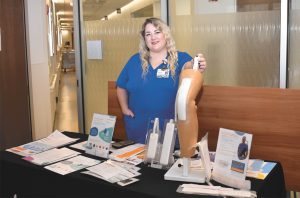 BayCare’s orthopedic surgery services includes the unique position of “Nurse Navigator.” Like the flight or sea navigators who safely guided journeys, nurse navigators guide patients completely through orthopedic surgery working with a surgeon.
BayCare’s orthopedic surgery services includes the unique position of “Nurse Navigator.” Like the flight or sea navigators who safely guided journeys, nurse navigators guide patients completely through orthopedic surgery working with a surgeon.
For example, nurse navigators are the “go to” people for those undergoing elective total joint replacements such as hip, knee, shoulder replacements or for people coming to the ER with a hip fracture.
Gina Rowland, a RN who manages orthopedic services for BayCare, explains how the navigators are patient advocates throughout the entire surgery process including:
• Pre-surgery education (a class, discussions in person, virtual, over the phone, text, email)
• Pre-admission testing (laboratory and blood work)
• Before and after surgery during the day of the surgery in the hospital
• During a patient’s stay in the hospital as an inpatient
• After discharge at home
“The main role of the navigator is coordinate the care of the entire patient’s journey,” Rowland said. “Navigators are there from pre-op (pre-operation) to post-op (post-operation). They are there to support the patient, their family, the surgeon. They are making sure the patient has a good experience. They are in the middle of that hub that everything revolves around. Navigators are there to make sure the orthopedic pathway is successful.”
Surgery can be a complex process and involves a myriad of medical and support staff. In addition to surgeons and surgeons’ office staff, there are pre-op, surgical and inpatient bedside nurses, anesthesiologists, physical and occupational therapists, patient care technicians, pharmacists, hospital care coordinators, home health and durable medical equipment staff (providers of walkers, canes, commodes, etc.,).
“Navigators make sure the patient gets appropriate care,” Rowland said. “Navigators hold everyone responsible. They keep tabs on how everything is progressing.”
Samantha DeWalt, a nurse navigator at St. Joseph’s Hospital in Tampa, said the biggest attribute navigators provide patients is trust.
“Patients trust me because I’m able to answer all their questions,” DeWalt said. “I’m the resource that can help them figure everything out. They are able to rely on me through the time they plan surgery, the time they are in the hospital and the time they get to leave the hospital. I have a relationship with them. They trust me that what I am going to tell them is going to be the right thing for them. I provide them with the education and knowledge they didn’t have before. I gain that trust from them. They come to know me as the doer, the person that gets things done for them.”
“It takes a team to deliver the best possible outcomes to our patients after joint replacement,” said Dr. Christopher Grayson, BayCare medical director for orthopedics. “The navigators are one of the most valuable members of our team. Without their dedication and hard work we would never be able to deliver the high-quality care we do.”
Orthopedic nurses have specialized education requirements and need to pass a exam to receive Orthopedic Nursing Certification (ONC). Continuing education is available through the National Association of Orthopedic Nurses.
 Central Florida Health and Wellness Magazine Health and Wellness Articles of the Villages
Central Florida Health and Wellness Magazine Health and Wellness Articles of the Villages


